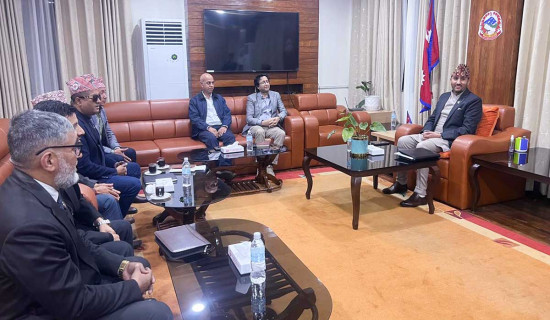- Wednesday, 17 December 2025
EVs Ease Urban Mobility
Britti Aryal
In the bustling cities of Nepal, where rapid urban development and economic progress intersect with complex environmental challenges, the issue of air pollution remains a pressing concern. The vibrant capital city, Kathmandu, often grapples with alarmingly high levels of air pollutants due to dramatic growth in number of vehicles, giving rise to significant health risks for its populace. The worsening of this problem due to traffic congestion has intensified the demand for sustainable transportation solutions. Despite various efforts to mitigate traffic congestion, including expanding road networks and implementing traffic management systems, these measures have often been insufficient to keep pace with the growing vehicle numbers. This highlights the urgent need for sustainable solutions like electric vehicles (EVs).
EVs offer a promising alternative to traditional combustion engine vehicles by producing zero tailpipe emissions, thereby improving air quality and public health outcomes. In cities where noise pollution is a pervasive issue, the quieter operation of EVs compared to conventional vehicles also contribute to improved quality of urban life. This quieter operation enhances the comfort of residents, and allows for better work environments. Moreover, quieter streets promote outdoor recreational activities and contribute to overall well-being, making urban areas more livable and sustainable for everyone.
As a nation abundant in hydropower potential, transitioning to EVs can effectively harness country’s plentiful renewable resources as well to meet transportation needs. By integrating EVs into the energy grid powered by hydroelectricity, Nepal can not only ensure energy security but also alleviate the economic and environmental consequences, aligning with global endeavours to combat climate change. This transition bolsters local industries and promotes job creation in the renewable energy sector. The country has a remarkable opportunity to diminish its reliance on imported fossil fuels by embracing EVs fueled by renewable energy sources, particularly hydroelectric power.
EVs present a great opportunity for urban mobility in Nepal by offering a cleaner and more efficient transportation system. But to promote the adoption of EVs, it is necessary to take few steps to cope with the challenges. Firstly, it is essential to expand charging stations to make it inclusive and accessible, especially for remote communities which encourages dwellers to switch to EVs. They present a unique chance for the country to move away from traditional fossil fuel-dependent transportation systems.
Secondly, it is crucial to address the investment challenges associated with infrastructure development to enhance EVs. This will require collaboration among stakeholders. Moreover, partnerships with international organisations and collaborating with entities specialising in renewable energy and sustainable transportation solutions could also help nation accelerate its transition towards EVs. It is also important for the authorities to consider providing incentives to encourage EV adoption, such as reducing import duties/taxes on EVs, and implementing favourable financing options like low-interest loan programmes.
Additionally, government policies that prioritise EVs in public procurement and provide grants for charging infrastructure development can also help drive demand. Awareness campaigns highlighting long-term cost savings and environmental benefits of EV ownership can enhance consumer confidence and boost adoption. Moreover, improving EVs with highly efficient and durable battery technology and advancing vehicle manufacturing such as enhanced ground clearance and robust suspension systems that help navigate Nepal’s challenging roads is necessary to accelerate the adoption of electric vehicles.
The integration of EVs offers a compelling opportunity to address environmental and economic challenges, enhance urban mobility, and advance towards a more sustainable transportation system. This aligns with the nation's abundant renewable energy resources and commitment to combat climate change, offering wide-ranging benefits for public health, environmental quality, and long-term economic prosperity.

















